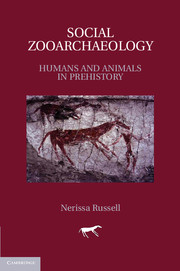Book contents
- Frontmatter
- Contents
- List of tables
- Preface
- 1 Beyond protein and calories
- 2 Animal symbols
- 3 Animals in ritual
- 4 Hunting and humanity
- 5 Extinctions
- 6 Domestication as a human–animal relationship
- 7 Pets and other human–animal relationships
- 8 Animal wealth
- 9 Meat beyond diet
- 10 Studying human–animal relations
- References
- Index
9 - Meat beyond diet
Published online by Cambridge University Press: 05 June 2012
- Frontmatter
- Contents
- List of tables
- Preface
- 1 Beyond protein and calories
- 2 Animal symbols
- 3 Animals in ritual
- 4 Hunting and humanity
- 5 Extinctions
- 6 Domestication as a human–animal relationship
- 7 Pets and other human–animal relationships
- 8 Animal wealth
- 9 Meat beyond diet
- 10 Studying human–animal relations
- References
- Index
Summary
[F]ood selection is imbued with social rules and meaning, and it is clear from the extent of its association with cultural rituals, both religious and secular, that meat is a medium particularly rich in social meaning.…Our attitudes toward meat, I suggest, are a reflection of our world view, and changing habits in meat consumption may well indicate a changing perception of the world we inhabit. (Fiddes 1991:5)
The bulk of zooarchaeological work has concerned itself with meat, but meat as protein and calories. Here I consider meat as food; that is to say, the social aspects of meat. Recently archaeologists have devoted substantial attention to the social facets of food and commensality (e.g., Halstead and Barrett 2004; Jones 2007; Twiss 2007), building on a long tradition of such work in sociocultural anthropology (e.g., Douglas 1984; Goody 1982; Harris 1985; Kahn 1986; Lévi-Strauss 1988). As noted in Chapter 4, meat in particular carries value well beyond its nutritional contribution. It is therefore especially suited to enacting social relationships. Sharing meat, offering it to guests, and conspicuously consuming it make powerful statements about identity and status.
Cooking and consumption
Until recently, cooking and consumption of meat received short shrift in zooarchaeological analysis. Gifford-Gonzales (1993) argues convincingly that in a field then dominated by men, zooarchaeologists, perhaps unconsciously, relegated food preparation to the female sphere, and hence regarded it as unimportant. Consumption in general was of little interest, both because of its domestic, feminine associations and because Marx and others privileged production. For example, Binford (1981:136), in his seminal work on the importance of taphonomy in zooarchaeological interpretation, presents ample detail and discussion of butchering techniques and their traces. However, he dismisses the traces of cooking and consumption in a single sentence, even though he notes that they are more numerous than butcher marks and often obscure them. Butchery, typically perceived as a masculine task, has been extensively studied. In fact, women often participate in butchery or even play a larger role in it than men (Szuter 2001). Cooking has only recently received archaeological attention.
- Type
- Chapter
- Information
- Social ZooarchaeologyHumans and Animals in Prehistory, pp. 358 - 394Publisher: Cambridge University PressPrint publication year: 2011



